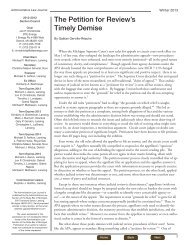目 录
TABLE OF CONTENTS - Warner Norcross & Judd LLP
TABLE OF CONTENTS - Warner Norcross & Judd LLP
- No tags were found...
Create successful ePaper yourself
Turn your PDF publications into a flip-book with our unique Google optimized e-Paper software.
Because the rules are complex and the penalties for noncompliance severe, importers commonly seek advice or services from outsideexperts such as customs brokers, attorneys or other consultants prior to importing products.Michigan specifically established foreign or free trade zones (FTZ) to encourage and promote international trade-related activities withcountries such as China. FTZ procedures are designed to reduce tariff barriers on domestic manufacture which incorporates foreign-sourcedparts. The FTZ can reduce, delay, or altogether eliminate U.S. customs duty on foreign goods to be stored, distributed, combined with otherforeign or domestic products, or used in manufacturing operations while in the zone. No customs duty or excise tax is paid on goods in anFTZ until they are transferred into U.S. commerce. Michigan has six major FTZ areas: Detroit, Battle Creek, Sault Ste. Marie, Kent-Ottawa-Muskegon counties, St. Clair County and Flint. Combined, Michigan FTZ are among the leaders the United States for annual volume ($6.04billion in 2005), and in the number of firms using FTZ services (51 companies in 2005).The major U.S. Export Control Laws are the International Traffic in Arms Regulations, the Foreign Assets Control Regulations andthe Export Administration Regulations. The U.S. State Department’s Directorate of Defense Trade Controls administers ITAR andgenerally regulates the export of defense articles and services. The U.S. Department of Treasury’s Office of Foreign Assets Controladministers FACR and regulates generally all U.S.-origin goods and services, regardless of strategic or military non-importance. U.S.Treasury also administers a list of major sanctioned countries and other areas subject to special controls. The U.S. Department ofCommerce’s Bureau of Industry and Security administers the export regulations. Generally speaking, the bureau is concerned withthe regulation of “dual use” goods and technologies that have both civilian and military applications. Chinese companies intendingto export high technology items from the U.S. (including chemicals, micro-organisms, toxins, high tech software and computertechnologies, telecommunications and navigation and avionics equipment), should be familiar with the export regulations. Lack ofknowledge is not a defense and there are many pitfalls for the unwary exporter. Because noncompliance can lead to serious penalties(including the prohibition of export activities), it is common for exporters to consult with licensed customs brokers and/or law firmswith respect to the export of particular items and the establishment of compliance procedures within the company.Risk ManagementChinese companies need to plan to protect their property and operations, and to protect against lawsuits from third parties. Inaddition to establishing proper corporate governance and internal procedures, insurance products protecting against many suchliabilities may be available.Generally speaking, Chinese companies should consider the following with respect to risk management:Doing business in Michigan● Obtaining property loss and damage insurance to insure facilities, equipment and inventory against destruction and theft.● Liability insurance to insure against liabilities to third parties (for example, employee lawsuits, product liability claims, etc.).● Establishing proper internal procedures and responsibility for matters relating to the storage, use and dispositionof hazardous and controlled materials; managing human resources; and ensuring proper documentation, filing andmaintenance of business records.● Confirming that products and services meet industry requirements relating to product labeling, safety and other standards.● Planning for currency rate fluctuations that might affect the business.● Carefully reviewing the company’s obligations under contracts and consulting with legal advisors with respect to important contracts.There is a growing number of Chinese-speaking professionals in Michigan who can assist investors with risk assessmentand compliance matters.27




